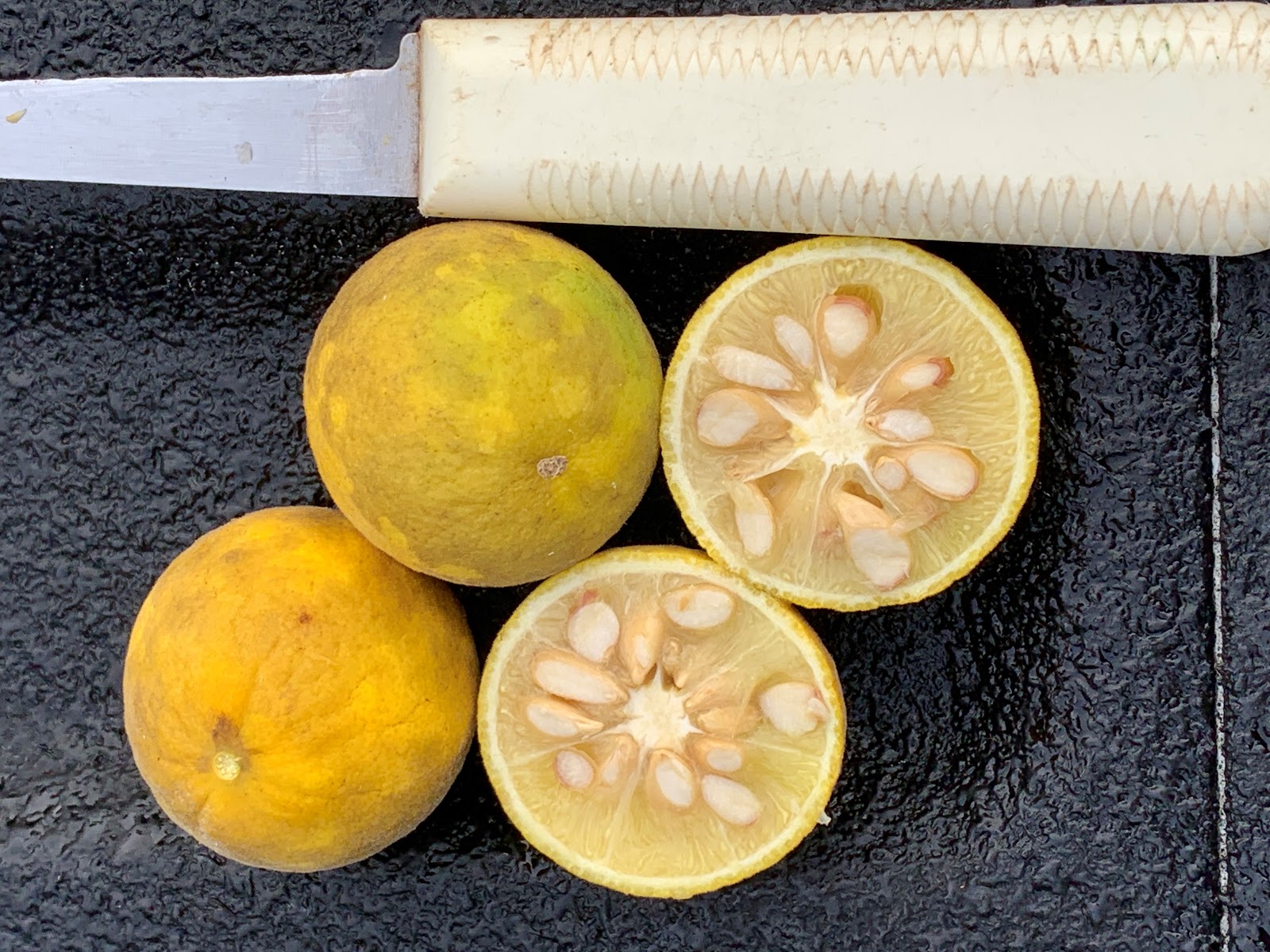Clem-Yuz and the Quest for a Cold-Hardy, Sweet Citrus
An interesting class of citrus hybrids involving the Clementine mandarin was produced by the late Dr. John Brown of Houston, TX, back in the 1960s. Dr. Brown was a physician by profession but was an active and avid breeder of citrus, attempting to produce very cold-hardy, edible citrus. He succeeded in a number of areas, and some of his hybrids are just now getting the recognition they deserve.
Many mainstream citrus are already complex hybrids involving two or more species of citrus, and this is true of the Clementine, which is probably a mandarin-orange hybrid (and the orange itself is probably a mandarin-pomelo hybrid). An interesting feature of citrus is that these hybrids produce seeds that are polyembryonic. Each seed will contain two embryos, one produced sexually (zygotic), the other a nucellar clone of the seed parent. Of the two embryos, the nucellar embryo will dominate, and the resulting offspring will be a juvenile version of the seed parent. For this reason, producing hybrids in citrus can be a formidable task.
That’s where the Clementine comes in. It is one of the mainstream citrus that regularly produces zygotic (sexually-produced) offspring, making it an attractive citrus for producing hybrids. Dr. Brown produced many hybrids using the Clementine, and one of those hybrids involved the Yuzu, a very cold-hardy, lemon-like papeda hybrid from Japan. Dr. Brown hoped to combine the cold-hardiness of Yuzu with the excellent flavor of Clementine. And he was mostly successful.
The best known among them are Clem Yuz 3-3 (aka 'Ten Degree Tangerine') and Clem Yuz 2-2, which hasn't yet been given a nickname. But it's worth pointing out that Dr. Brown produced dozens of these, all slightly different. Many have crept into the trade over the years, often masquerading as 2-2 or 3-3. In fact, if you can find Clem-Yuz offered in a nursery, chances are that there is no distinction made between the two varieties, even though they are quite different.
Clem Yuz 3-3 is the most commonly available of these hybrids, and can be found in specialty nurseries. It has a round, orange fruit on an upright tree. The peel tends to be mildly adherent (much like Clementine) and the taste is sweet-sour, a little sharp but otherwise good. Its main drawback is that the fruit ripen relatively late, around Christmas, making the fruit susceptible to an early freeze.
Clem Yuz 2-2 is less well known. It produces a larger fruit that 2-2 and is much easier to peel. It ripens in mid-October and the fruit is mild and sweet. The first time I tried the fruit were from some sent to me directly by Dr. John Brown in the fall of 2004. Since then, I have had the fruit several times, and always enjoyed it.
As I mentioned earlier, Dr. Brown produced dozens of Clem-Yuz hybrids, and only a few were ever named. However, there are trees around that in my opinion are Clem
Yuz hybrids, but don't fit neatly into the descriptions of 2-2 or 3-3. There
was a nice Clem-Yuz in Augusta, GA, that produced sharply sour fruit, but which
had an excellent, clean lemon-lime flavor.
I am sure that it will make an amazing lemon substitute for colder areas
of Zone 8. The tree was removed by
development, but I managed to get seeds a few years ago and have some seedlings
coming along In addition, a friend of
mine in North Carolina gave me a seedling that was labelled simply "Yuzu
hybrid." I was expecting a lemon-like fruit, but when it fruited for the
first time, I was surprised to see that it produced a beautiful
"tangerine" that ripened by late October. It somewhat resembles 2-2,
but the rind color is wrong (too orange) and the pulp is a deeper orange color,
rather than pale orange as with Clem Yuz 2-2. What is it? A mystery!
Clem
Yuz 3-3 is called the "Ten Degree Tangerine" because it is supposedly
reliably hardy to at least that temperature. Like its parent the Yuzu, Clem Yuz
hybrids can withstand almost total defoliation in winter without affecting
subsequent flowering or fruiting. That said, there are many reports of Clem Yuz
hybrids enduring temperatures down to about 10F with no protection without
adverse effects. How much lower they can take remains an open question. One of
the problems with "Zone 7" temperatures is that they usually are
accompanied by long duration, which only makes matters worse. Suffice to say
that Clem Yuz hybrids are reliably hardy to Zone 8 and handle short freezes
(12-36 hours total) well.






Comments
Post a Comment